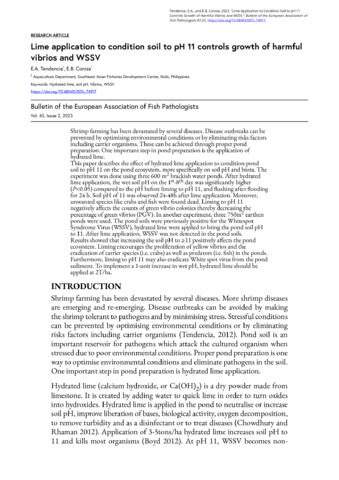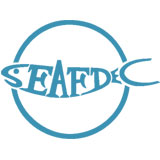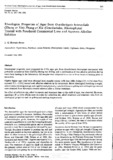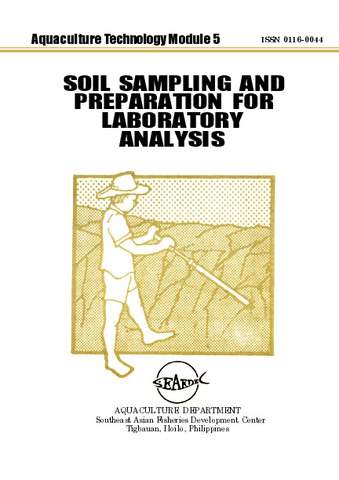Lime application to condition soil to pH 11 controls growth of harmful vibrios and WSSV

Associated URL
eafpbulletin.scholasticahq.comDate
2023-05-26Page views
339Metadata
Show full item recordCited times in Scopus
5 readers on Mendeley
Share
Abstract
Shrimp farming has been devastated by several diseases. Disease outbreaks can be prevented by optimising environmental conditions or by eliminating risks factors including carrier organisms. These can be achieved through proper pond preparation. One important step in pond preparation is the application of hydrated lime.
This paper describes the effect of hydrated lime application to condition pond soil to pH 11 on the pond ecosystem, more specifically on soil pH and biota. The experiment was done using three 600 m2 brackish water ponds. After hydrated lime application, the wet soil pH on the 1st-8th day was significantly higher (P<0.05) compared to the pH before liming to pH 11, and flushing after flooding for 24 h. Soil pH of 11 was observed 24-48h after lime application. Moreover, unwanted species like crabs and fish were found dead. Liming to pH 11 negatively affects the counts of green vibrio colonies thereby decreasing the percentage of green vibrios (PGV). In another experiment, three 750m2 earthen ponds were used. The pond soils were previously positive for the Whitespot Syndrome Virus (WSSV), hydrated lime were applied to bring the pond soil pH to 11. After lime application, WSSV was not detected in the pond soils.
Results showed that increasing the soil pH to ≥11 positively affects the pond ecosystem. Liming encourages the proliferation of yellow vibrios and the eradication of carrier species (i.e. crabs) as well as predators (i.e. fish) in the ponds. Furthermore, liming to pH 11 may also eradicate White spot virus from the pond sediment. To implement a 1-unit increase in wet pH, hydrated lime should be applied at 2T/ha.
Keywords
Hydrated lime soil pH Vibrios WSSVSuggested Citation
Tendencia, E. A., & Coniza, E. B. (2023). Lime application to condition soil to pH 11 controls growth of harmful vibrios and WSSV. Bulletin of the European Association of Fish Pathologists, 43(2). https://doi.org/10.48045/001c.74917
Subject
Taxonomic term
Collections
- AQD Journal Articles [1248]
Related items
Showing items related by title, author, creator and subject.
-
Pond liming and liming materials for brackishwater ponds
Subosa, P. F. (ASEAN/UNDP/FAO Regional Small Scale Coastal Fisheries Development Project, 1986)Vital information aquaculturists need to know on lime are: (a) what lime to use; (b) why lime is used; (c) which form to apply; (d) how much to apply; and (e) when to apply. Experiments on the use of lime in ... -
Rheological properties of agar from Gracilariopsis heteroclada (Zhang et Xia) Zhang et Xia (Gracilariales, Rhodophyta) treated with powdered commercial lime and aqueous alkaline solution
Hurtado-Ponce, A. Q. (Walter de Gruyter, 1992)Rheological properties were measured for 1.5% agar gels from Gracilariopsis heteroclada pre-treated with powdered commercial lime (CaCO3) during sun drying, and a combination of two alkaline solutions during ... -
Soil sampling and preparation for laboratory analysis
Tenedero, Rosita A.; Surtida, Marilyn B. (Aquaculture Department, Southeast Asian Fisheries Development Center, 1986)




